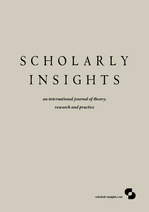Artificial intelligence and space exploration: A philosophical analysis of their intersection and implications
Keywords:
Artificial intelligence, space exploration, philosophy of technology, space governance, political philosophyAbstract
This article examines the philosophical intersections between artificial intelligence (AI), space exploration, and their conceptual frameworks. As AI systems become increasingly integrated into nearly all domains of human life, and space exploration advances toward potential habitable environments beyond Earth, philosophy becomes essential for interpreting these transformative developments. The paper investigates definitions, boundaries, and applications of AI while addressing philosophical discussions around habitable space environments and potential space societies. The research employs qualitative document analysis to examine the theoretical foundations of AI, from algorithmic processes to complex learning systems. It explores AI's fundamental limitations, particularly regarding consciousness and self-awareness, while reviewing existing space agreements and international legal frameworks. The analysis demonstrates that despite these important initiatives, no definitive conclusions have been reached regarding governance structures for habitable space. The study argues that political philosophy, which has historically provided robust frameworks for conceptualizing societies, will be crucial for developing ethical and just structures for potential space communities. As AI and space exploration converge, philosophical inquiry becomes indispensable for addressing fundamental questions about governance, ethics, consciousness, and human experience in these new domains. The implications extend to technology development, policy formation, education, and interdisciplinary research.
Downloads
References
Adaş, E., & Erbay, B. (2021). Yapay zekâ sosyolojisi üzerine bir değerlendirme. Gaziantep University Journal of Social Sciences, 21(1), 326-337.
Agrawal, A., Gans, J., & Goldfarb, A. (2018). Prediction machines: The simple economics of artificial intelligence. Harvard Business Press.
Arf, C. (1959). Makine düşünebilir mi ve nasıl düşünebilir. Atatürk Üniversitesi-Üniversite Çalışmalarını Muhite Yayma ve Halk Eğitimi Yayınları Konferanslar Serisi, (1), 91-103.
Aybek, H. S. (2013). Siyaset felsefesi ve toplumsal düzen. Gazi Kitabevi.
Bayık, F. (2019). Aristoteles ve Descartes bağlamında akıl ve zekâ kavramlarının farkları. Kaygı. Bursa Uludağ Üniversitesi Fen-Edebiyat Fakültesi Felsefe Dergisi, 18(1), 172-187.
Bennet, M. R. (2017). Development of the concept of mind. Australian & New Zealand Journal of Psychiatry, 41(12), 943-956.
Blackburn, S. (2016). The Oxford dictionary of philosophy (3rd ed.). Oxford University Press.
Boden, M. A. (2018). Artificial intelligence: A very short introduction. Oxford University Press.
Bostrom, N. (2014). Superintelligence: Paths, dangers, strategies. Oxford University Press.
Bostrom, N., & Yudkowsky, E. (2014). The ethics of artificial intelligence. In K. Frankish & W. M. Ramsey (Eds.), The Cambridge handbook of artificial intelligence (pp. 316-334). Cambridge University Press.
Bowen, G. A. (2009). Document analysis as a qualitative research method. Qualitative Research Journal, 9(2), 27-40.
Bozkurt, G. (2011). Uzay teknolojileri ve Türkiye. İmge Kitabevi.
Braun, V., & Clarke, V. (2012). Thematic analysis. In H. Cooper (Ed.), APA handbook of research methods in psychology (Vol. 2, pp. 57-71). American Psychological Association.
Brooks, R. (2002). Flesh and machines: How robots will change us. Pantheon Books.
Brynjolfsson, E., & McAfee, A. (2017). The second machine age: Work, progress, and prosperity in a time of brilliant technologies (2nd ed.). W.W. Norton & Company.
Cevizci, A. (2005). Paradigma felsefe sözlüğü (5th ed.). Paradigma Yayıncılık.
Chalmers, D. J. (2010). The singularity: A philosophical analysis. Journal of Consciousness Studies, 17(9-10), 7-65.
Civalek, Ö. (2003). Yapay zekâ- Ömer Civalek'le söyleşi. TMH - Türkiye Mühendislik Haberleri, 423(1), 40-50.
Cockell, C. S. (2016). Extraterrestrial liberty: An inquiry into the nature and causes of tyrannical government beyond the Earth. Edinburgh University Press.
Copeland, B. J. (2004). The essential Turing. Oxford University Press.
Creswell, J. W. (2017). Qualitative inquiry and research design: Choosing among five approaches (4th ed.). Sage Publications.
Çevik, A. D. (2020). Bilim felsefesi bilim pratiğinden ne öğrenebilir?. Kilikya Felsefe Dergisi, (2), 110-132.
Dehaene, S., Lau, H., & Kouider, S. (2017). What is consciousness, and could machines have it? Science, 358(6362), 486-492.
Dennett, D. C. (2017). From bacteria to Bach and back: The evolution of minds. W.W. Norton & Company.
Denzin, N. K., & Lincoln, Y. S. (Eds.). (2018). The SAGE handbook of qualitative research (5th ed.). Sage Publications.
Dick, S. J. (2018). Astrobiology, discovery, and societal impact. Cambridge University Press.
Dickens, P., & Ormrod, J. S. (2016). The Palgrave handbook of society, culture and outer space. Palgrave Macmillan.
Dilek, G. Ö. (2019). Yapay zekânın etik gerçekliği (Doctoral dissertation, Uluslararası Sosyal Bilimler Programları Değerlendirme ve Akreditasyon Derneği).
Domingos, P. (2015). The master algorithm: How the quest for the ultimate learning machine will remake our world. Basic Books.
Dönmez, S. (2020). Felsefi bağlamda yapay zekâ ve 2025 sendromu. Çukurova Üniversitesi İlahiyat Fakültesi Dergisi, 20(2), 748-760.
Dreyfus, H. L. (1992). What computers still can't do: A critique of artificial reason. MIT Press.
Erdem, T. (2018). Uluslararası ilişkilerde yeni perspektif: Astropolitiğe giriş. Trakya Üniversitesi Sosyal Bilimler Dergisi, 20(1), 431-446.
Erdem, T. (2019). Uzay hukukunda güncel gelişmeler. Marmara Üniversitesi Hukuk Fakültesi Hukuk Araştırmaları Dergisi, 25(2), 1160-1178.
Erdem, T., & Orki, A. (2019). Uluslararası ilişkilerde klasik askeri güç anlayışının evrimi: Dış uzay sahası. İzmir Kâtip Çelebi Üniversitesi İktisadi ve İdari Bilimler Fakültesi Dergisi, 2(1), 12-28.
Floridi, L. (2019). The logic of information: A theory of philosophy as conceptual design. Oxford University Press.
Floridi, L., & Chiriatti, M. (2020). GPT-3: Its nature, scope, limits, and consequences. Minds and Machines, 30(4), 681-694.
Gabriel, M. (2018). I am not a brain: Philosophy of mind for the 21st century. Polity Press.
Gamez, D. (2018). Human and machine consciousness. Open Book Publishers.
Goodfellow, I., Bengio, Y., & Courville, A. (2016). Deep learning. MIT Press.
Graziano, M. S. A. (2019). Rethinking consciousness: A scientific theory of subjective experience. W.W. Norton & Company.
Haugeland, J. (1989). Artificial intelligence: The very idea. MIT Press.
Hawkins, J. (2021). A thousand brains: A new theory of intelligence. Basic Books.
Ince, H., Imamoğlu, S. E., & Imamoğlu, S. Z. (2021). Yapay zekâ uygulamalarının karar verme üzerine etkileri: Kavramsal bir çalışma. International Review of Economics and Management, 9(1), 50-63.
Işıldak, M. (2006). Felsefe nedir?. FLSF Felsefe ve Sosyal Bilimler Dergisi, (1), 45-58.
İşler, B., & Kılıç, M. (2021). Eğitimde yapay zekâ kullanımı ve gelişimi. Yeni Medya Elektronik Dergisi, 5(1), 1-11.
Jordan, M. I., & Mitchell, T. M. (2015). Machine learning: Trends, perspectives, and prospects. Science, 349(6245), 255-260.
Kaplan, J. (2016). Artificial intelligence: What everyone needs to know. Oxford University Press.
Karakulak, B. (2019). Devletlerin uzay çalışmaları ve Türkiye'nin uzay politikası (Master's thesis, Sosyal Bilimler Enstitüsü).
Kaşıkara, M. S. (2017). Devletlerin uzay faaliyetlerinden doğan sorumluluğu. Adalet Yayınevi.
Kelleher, J. D. (2019). Deep learning. MIT Press.
Keskenler, M. F., & Keskenler, E. F. (2017). Geçmişten günümüze yapay sinir ağları ve tarihçesi. Takvim-i Vekayi, 5(2), 8-18.
Khan, T. M. (2019). Education policy reforms in Pakistan. Oxford University Press.
Koch, C. (2019). The feeling of life itself: Why consciousness is widespread but can't be computed. MIT Press.
Koçyiğit, A., & Darı, A. B. (2023). Yapay zekâ iletişiminde ChatGPT: İnsanlaşan dijitalleşmenin geleceği. Stratejik ve Sosyal Araştırmalar Dergisi, 7(2), 427-438.
Köroğlu, Y. (2017). Yapay zekâ'nın teorik ve pratik sınırları. Boğaziçi Üniversitesi Yayınevi.
Krippendorff, K. (2018). Content analysis: An introduction to its methodology (4th ed.). Sage Publications.
Kurzweil, R. (2012). How to create a mind: The secret of human thought revealed. Viking Books.
LeCun, Y., Bengio, Y., & Hinton, G. (2015). Deep learning. Nature, 521(7553), 436-444.
Legg, S., & Hutter, M. (2007). A collection of definitions of intelligence. Frontiers in Artificial Intelligence and Applications, 157, 17-24.
Lin, J., Singer, P. W., & Ding, D. (2018). China's influence on the global Middle Class. The Brookings Institution Press.
Macit, M., İplikçi, N., & Bingöl, O. (2018). Siyaset felsefesi. Nobel Akademik Yayıncılık.
Mainzer, K. (2020). Artificial intelligence - When do machines take over? Springer.
Marcus, G., & Davis, E. (2019). Rebooting AI: Building artificial intelligence we can trust. Pantheon Books.
Marsiske, H. (2019). Mission to Earth: Understanding our planet from space. Springer.
McCarthy, J., Minsky, M. L., Rochester, N., & Shannon, C. E. (2006). A proposal for the Dartmouth summer research project on artificial intelligence, August 31, 1955. AI Magazine, 27(4), 12-14.
Merriam, S. B., & Tisdell, E. J. (2016). Qualitative research: A guide to design and implementation (4th ed.). Jossey-Bass.
Milligan, T. (2015). Nobody owns the Moon: The ethics of space exploitation. McFarland & Company.
Minsky, M. (2007). The emotion machine: Commonsense thinking, artificial intelligence, and the future of the human mind. Simon & Schuster.
Mitchell, M. (2019). Artificial intelligence: A guide for thinking humans. Farrar, Straus and Giroux.
Müller, V. C. (Ed.). (2016). Risks of artificial intelligence. CRC Press.
Nilsson, N. J. (2010). The quest for artificial intelligence: A history of ideas and achievements. Cambridge University Press.
Patton, M. Q. (2015). Qualitative research & evaluation methods: Integrating theory and practice (4th ed.). Sage Publications.
Poole, D. L., & Mackworth, A. K. (2017). Artificial intelligence: Foundations of computational agents (2nd ed.). Cambridge University Press.
Russell, S., & Norvig, P. (2020). Artificial intelligence: A modern approach (4th ed.). Pearson.
Russell, S., Dewey, D., & Tegmark, M. (2015). Research priorities for robust and beneficial artificial intelligence. AI Magazine, 36(4), 105-114.
Schwitzgebel, E., & Garza, M. (2020). Designing AI with rights, consciousness, self-respect, and freedom. In S. Matthew Liao (Ed.), Ethics of artificial intelligence (pp. 291-332). Oxford University Press.
Searle, J. R. (2010). Making the social world: The structure of human civilization. Oxford University Press.
Searle, J. R. (2014). Consciousness and language. Cambridge University Press.
Sejnowski, T. J. (2018). The deep learning revolution. MIT Press.
Sevim, O. U. (2022). Uzay kaynaklarının kullanımına ilişkin BM perspektifi. Adalet Dergisi, (69), 351-372.
Shah, M., & Ishfaq, S. (2018). Educational policy reforms in Pakistan: Critical analysis. Journal of Education and Educational Development, 5(2), 158-175.
Silver, D., Hubert, T., Schrittwieser, J., Antonoglou, I., Lai, M., Guez, A., Lanctot, M., Sifre, L., Kumaran, D., Graepel, T., Lillicrap, T., Simonyan, K., & Hassabis, D. (2018). A general reinforcement learning algorithm that masters chess, shogi, and Go through self-play. Science, 362(6419), 1140-1144.
Sökmen, A. İ. (2016). Uzay jeopolitiği: Güç dengesinde önemli avantaj alanı. Ankara Üniversitesi SBF Dergisi, 71(1), 133-156.
Tegmark, M. (2017). Life 3.0: Being human in the age of artificial intelligence. Alfred A. Knopf.
Tononi, G., & Koch, C. (2015). Consciousness: Here, there and everywhere? Philosophical Transactions of the Royal Society B: Biological Sciences, 370(1668), 20140167.
Topdemir, H. G. (2009). Felsefe nedir? Bilgi nedir? Türk Kütüphaneciliği, 23(1), 119-133.
United Nations Office for Outer Space Affairs. (2022). Treaties and principles on outer space. https://www.unoosa.org/oosa/en/ourwork/spacelaw/treaties.html
Vartanian, A. (1999). La Mettrie's L'homme machine: A study in the origins of an idea. Princeton University Press.
Yeşilkaya, N. (2022). Felsefi bir sorun olarak yapay zekâ. Bozok Üniversitesi İlahiyat Fakültesi Dergisi, 22(22), 97-126.
Zeki, S. (2007). The disunity of consciousness. Progress in Brain Research, 168, 11-268.
Downloads
Published
How to Cite
Issue
Section
License
Copyright (c) 2025 Symphony

This work is licensed under a Creative Commons Attribution 4.0 International License.








